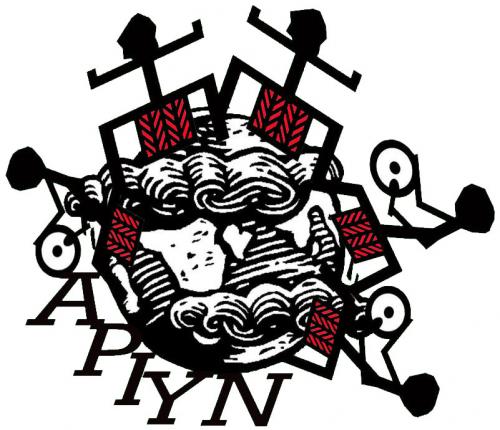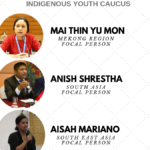18th Session of the United Nations Permanent Forum on Indigenous Issues
Agenda Item 9: Special theme: “Indigenous peoples’ Traditional knowledge, generation, transmission and protection”
By Aisah Mariano
Asia Young Indigenous Peoples Network (AYIPN, formerly Asia Pacific Indigenous Youth Network APIYN)
April 23, 2019
Thank you Chair.
In behalf of Asia Young Indigenous Peoples Network (AYIPN, formerly Asia Pacific Indigenous Youth Network APIYN), a network of indigenous youth organizations for the protection and promotion of indigenous youth rights, I would like to read this statement and recommendations of indigenous youth on Agenda Item 9: Indigenous Peoples’ Traditional knowledge, generation transmission and protection”.
Our elders passed down traditional knowledge through stories, songs, dances, chants and learning by doing. Communities developed indigenous systems and practices that provides harmony in a community inculcating the common good for all. Protection of our traditional systems and practices enabled our communities to become sustainable in terms of management of our natural resources and in our political, legal, social and cultural institutions. The continuous transmission of traditional knowledge is a manifestation of our assertion to self-determination and collective rights.
However, identity is being lost as states and private corporations grab our ancestral lands, territories and natural resources to give way to extractive industries and other so-called “development” projects. Poverty persists due to state neglect, with insufficient if not lack of basic social services such as education and healthcare. Intensified militarization of indigenous communities brings about gross violations of human rights and indigenous peoples’ collective rights. Indigenous culture, language, values and spirituality are disintegrating fast as discrimination, non-recognition, misinformation and misrepresentation prevail.
Indigenous youth and children are inheritors of the rich culture and has a vital role in further promotion and protection of indigenous culture and rights. But with the current state, what future is there to develop and promote? While ancestral territories are destroyed by development aggressors, indigenous youth continue to lose identity and thus forgetting our culture. Development so to speak should be guided by the common wants and needs of indigenous communities and not only a few. Land is life for indigenous peoples, but as this are targets for profits of capitalists, transmission of traditional knowledge is at risk.
AYIPN as a network promotes inter-generational cultural exchanges among elders and youth as part of the revitalization of our culture. Member organizations in Bangladesh, Cambodia, Nepal, India, Philippines, Indonesia, Malaysia and Taiwan have long developed in their programs different means to promote and protect traditional knowledge through training and advocacy, video-documentaries, song-writing, theater performances, forums and conferences and cultural exchanges. These actions are initiated by grassroots indigenous youth organizations with its objective to preserve the identity left.
The indigenous youth further states and recommends the following:
- We call on governments to ensure the full and effective participation of the indigenous youth on matters affecting them at the local, national, regional and international levels. Allowing and supporting indigenous youth to implement projects that will help in the transmission of traditional knowledge.
- We call governments to ensure the full implementation of UNDRIP and other related UN policies in the local and national level and must review and amend the national laws, policies and programs that are in conflict with the Indigenous Peoples’ rights and for the states to include the Indigenous Peoples in these Processes.
- We call on governments to support in the formation and implementation of programs in promoting indigenous people’s cultural education among children and youth and the recognition of indigenous peoples traditional cultures and protection of their intellectual property rights and traditional knowledge.
- For the states and multinational corporations to respect indigenous people’s rights and ensure FPIC process are followed. Recognize their accountability as the major contributors to the degradation of our natural resources and upheaval of our communities. With this we urge UN agencies to work with states to fully stop development aggression in the form of large scale mining operations, massive logging, construction of multi-purpose and hydro-electric dams, plantations and other monoculture agriculture, nuclear plants, oil exploration and production in our territories, as well as abolish false and market-based solutions to the global crises. And ensure the FPIC process are followed.
- We denounce the commercialization and bastardization of our culture. We urge our elders and indigenous families to teach their children their indigenous cultures, practices, values and languages. We will continue our campaign and activities on the revitalization of our indigenous cultures. And we call on the states, UN bodies and concerned private institutions to support these initiatives of the youth.
- To stop the militarization of Indigenous Peoples communities; to end the vilification and criminalization of our leaders, organizations and collective actions; and give justice and indemnification to all the victims of human rights violations. We recommend the appointment of a special Rapporteur on the impacts of Militarization and include these impacts in future studies.
- Lastly, for governments, civil society organizations and indigenous peoples organization to promote and protect traditional knowledge.
Thank you.


